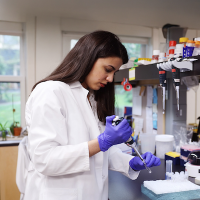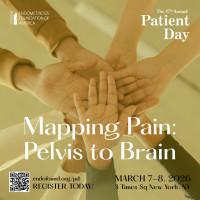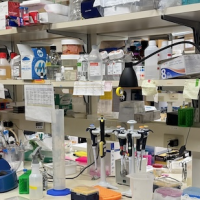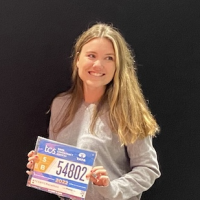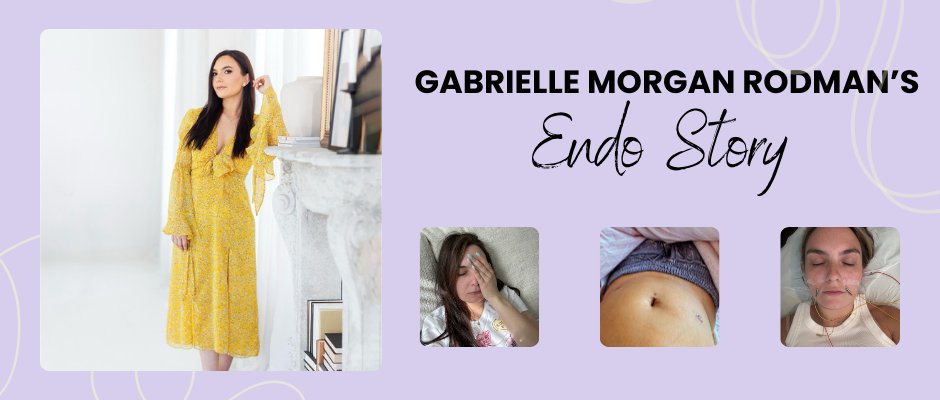
Gabrielle Morgan Rodman has been battling horrific endometriosis symptoms every month for 23 years. Her stories are heartbreaking and, in some cases, mind-blowing. One, in particular, occurred a decade ago, when she told a gynecologist that one of her symptoms was painful sex.
“She looked at me very seriously, with no humor in her tone at all, and said, ‘You should have a bottle of wine before sex.’ I had no words,” Rodman said. “At that point, the pain had taken over my life. I was so on edge, and she pushed my anxiety further. My first thought was that there was no hope. I was trusting someone with this level of degrees, and if this was her suggestion, then nobody was going to be able to help me.”
Rodman will have excision surgery near her Nashville home later this week. She had one other surgery last year, an ablation, which did nothing to alleviate her pain. She hopes this one will finally bring her the health and peace that she hasn’t experienced since fifth grade.
“I’m hopeful but extremely anxious,” Rodman said. “[My surgeon] saw an abnormality on my uterus from my scan, but she can’t tell what it is, so that is what’s driving my anxiety. And, of course, since the last surgery didn’t bring me any relief, I have a lot of doubt and uncertainty that I am trying to push out.”
Rodman’s skepticism, considering nearly a lifetime of pain and isolation, is understandable. And to so many other endometriosis patients, relatable.
Heavy bleeding and pain have always been Rodman’s primary symptoms. Sometimes she loses so much blood that she passes out. The pain, she said, can “take my breath away.” When she was in school, missing at least three days became a monthly routine.
“My mom would have to write notes and talk to teachers to explain that we were trying to get answers from doctors,” Rodman said. “In high school, they wanted to penalize me for missing days because they couldn’t believe it could be from period cramps. I also played tennis in high school, but if I were set to play in a match and would have pain the night before, I’d be in tears, afraid I would have to tell my coach that I couldn’t play. It was tough to navigate all the way through college. I felt very guilty, too.”
That guilt has never subsided.
“It wasn’t just classes that I had to miss,” Rodman said. “I’ve missed birthdays, weddings, and other events, or have had to leave early. I’ve missed a lot of work over the years. Sometimes, I wonder how I held on to certain jobs. It never looked good, and nobody could understand what I was going through. Even the women I worked with didn’t understand it.”
In 2015, when Rodman was 23 and working at her dream job in New York City, the pain began extending beyond her period each month.
“I started getting continuous chronic pelvic pain so bad that it felt like something was burning inside of me, like a hot poker 24/7,” Rodman said. “I was tested for everything, and all the results came back negative. I was sleeping with ice packs between my legs. It also took a toll on my mental health. It was all I could focus on.”
Over the next six months, Rodman saw what she said were considered some of the top gynecologists in New York.
“The responses I got from them were pretty upsetting,” Rodman said. “They said the pain was in my head. They asked me if I had tried anxiety medicine. They told me I seemed like a high-strung person. They thought I might have pelvic congestion syndrome. They told me that maybe I was going through early menopause.” This was also when a gynecologist offered her the bottle-of-wine advice.
“That’s when I started to question my sanity,” Rodman said. “So many people were suggesting that this was a manifestation of my anxiety, and I actually started to question if they were right. I even went to a psychiatrist to ask if there was a possibility that I could be creating this in my head. She said, ‘Absolutely not,’ and she ended up being instrumental in guiding me through my journey during that time.”
Rodman continued to live with the daily pain until 2018, when, desperate for help, she found a gynecologist in New York who she described as “the most compassionate person I ever met.” He reviewed her history, suggested a few possible causes of her pain—including endometriosis—and gave her vaginal Botox injections. Rodman said, according to the doctor, her muscles were releasing acid when they contracted, causing the constant burning sensation. The injections would prevent those muscles from contracting.
And they worked.
Though her pain was still prevalent during her periods, the daily pain outside of her periods was essentially gone. But there was one significant problem: the doctor treated the symptom and not the cause.
“When he said it could be endometriosis, it was just something he threw out there with some other possibilities and didn’t focus on. I didn’t even know what endometriosis was,” Rodman said. “He was focused on treating the pain and didn’t do a diagnostic laparoscopy. I just thought, ‘Okay, the Botox seems to be taking away my daily pain, and he’s not stressing that I should be tested for endometriosis, so I’ll just go about my life.’ Had he stressed the endometriosis more or told me to see a specialist, I would have gone that route.”
Rodman would have more Botox injections when needed, but last year, even those weren’t working.
“The pain and bleeding came back aggressively,” Rodman said. “I was shedding a lot of hair. My fatigue was awful. I had no energy whatsoever. It was very difficult to get through the work day.”
Living in Nashville at that time, Rodman saw a gynecologist there, who suggested that she might have endometriosis. The doctor did a laparoscopy and found endometriosis encasing Rodman’s right ovary. It was the only endometriosis she could find, and she burned it through ablation. EndoFound does not recommend this method for removing lesions, as it does not remove tissue beneath the surface, can damage surrounding healthy tissue, and can create significant scar tissue. But many patients don’t know that.
“I think this is a critical part of my story,” Rodman said. “I didn’t know enough to ask if this was the only and best way to treat it. Now, knowing what I know, I’m feeling all the emotions of guilt because I didn’t do proper research. Luckily, the surgery went fine in terms of there being no complications, but I experienced no relief whatsoever. I’m gearing up for my excision surgery [with a different surgeon] this week, but had I known more the first time, maybe I wouldn’t have to put my body through this again.”
Rodman hopes that sharing her story will serve two purposes: to educate those who don’t know anything about endometriosis so that they can empathize with those who do, and to help those who have the disease find support and relief sooner rather than later.
“I still feel as isolated today as when I was 10 because so many of my friends don’t know about or understand endometriosis, and if they don’t understand it, I can’t form the bond with them that I need, Rodman said. “If I say to them, ‘I have debilitating periods’ or ‘I’ve been missing a lot of work,’ they can’t understand why. The only thing that has brought me comfort is reading the stories of others who have it. That’s given me a level of connection I need to avoid completely spiraling.
“It’s also reminded me that I’m not alone, and that I need to keep the faith,” Rodman continued. “The last several years have been some of the darkest times in my life, and if I can get through that, I can get through anything. Anyone with symptoms needs to be fearless in finding answers. Advocate for yourself. Continue to demand answers, no matter how many doctors you’ve talked to. Nobody knows your body better than you do.”
*Patient stories submitted to EndoFound.org are the patient's views, not necessarily those of the foundation. All testimonials are from real patients, may not reflect the typical patient’s experience, and are not intended to represent or guarantee that anyone will achieve the same or similar results.














